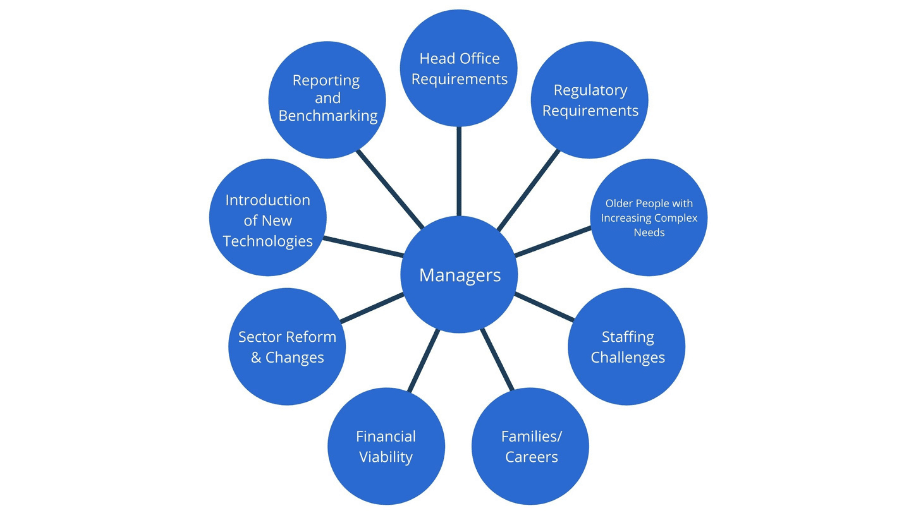Who is Supporting Middle-Management?
Who is Supporting Middle-Management?
I am increasingly hearing reports of middle management (Facility Manager, Home Care Service Managers etc.) becoming disengaged, disillusioned and some leaving aged care vowing never to return.

There is no doubt that managing any kind of aged care service is an occupational hazard for stress and burnout. Increasing regulatory scrutiny, spotlight of the Royal Commission, pressures to meet industry benchmarks, increased competition, hypervigilant line-managers, complex care needs and financial constraints are making life very challenging for middle-managers. Then there are families/careers, some of who have a ‘love-language’ expressed through forceful advocacy. With the cost of living, especially in the cities and other social changes, it can be difficult to attract and retain staff. One only has to read the aged care jobs to see the tsunami of middle-managers circulating around, or leaving the sector altogether. When the factors below are considered, it is no surprise that the high workload and demands is leading to a high turnover in middle-management roles. And… all of this is occurring in the midst of a pandemic amidst all the additional pressures that brings on aged care.
Addressing this trend is a complex issue requiring research and consideration by policy makers as it is and will continue to directly impact the quality of care and quality of life of older people. One possible solution is the provision of professional supervision, mentoring and coaching to provide one-on-one support to these managers. I have listened to many senior managers who say that the line managers are providing support to middle-managers. On the contrary, middle-manager report they this ‘support’ is much more about oversight, monitoring and reporting in the context of a transactional relationship. Best practice in clinical governance requires accountability and oversight, so that is to be expected. However, that still leaves a gap in the area of directly supporting middle-managers as leaders. In this complex, dynamic and demanding role, more than ever they need a space to learn, reflect and grow in their capacity, competence and capability. Aged Care Managers as a cohort are themselves most likely to be female and of mature years. For this reason, they rarely need a coaching or mentoring relationship where they are considered to be a ‘junior’ needing to learn from a ‘senior’. These are experienced and seasoned leaders who are not lacking in knowledge and don’t need to be preached to – they need to be heard, respected and supported in a collaborative relationship such as Professional Supervision. Professional Supervision is traditionally associated with professions such as psychologists and it has been considered essential for safe practice. It is increasingly becoming more prevalent for those in pastoral ministry as recommended by the Royal Commission into Institutional Responses to Child Sexual Abuse.
Professional supervision offers a safe space to pause and reflect on practice and how one is managing the pressures, complexities and challenges of a work role. I believe independent professional supervision could be a key contributor to better supporting middle-managers and stem the high turnover rates resulting from burnout. It is simply unrealistic to expect line managers to fulfil the role of a qualified Professional Supervisor. The relationship between middle-managers and their line manager is necessarily transactional and operational. Line managers simply do not have the time and expertise to offer quality Professional Supervision. Nor is it realistic to expect a middle-manager to feel safe in disclosing issues to their line manager about their professional practice. It is very important for a supervisee to have rapport, trust, and confidence in their Professional Supervisor. Nor are these attributes guaranteed to exist in a line management relationship. Supervisees should have the choice of whom they wish to confide in as Professional Supervisor as feeling ‘safe’ is a prerequisite to reflective learning. Having an independent, external professional supervision who provides a safe space to reflect on practice could well be at least one answer to stem the tide of turnover.
I have raised the possibility of Professional Supervision with a few CEOs and Executive Managers and been told it would be prohibitively expensive in terms of cost and time. However, the cost of turnover at a management level would far exceed the relatively minor costs of $1000 per year per person for Professional Supervision. Also, there are an abundance of high-quality, Professional Supervision Interns available through Chaplaincy Australia offering their services for free whilst they build up their hours. These Interns have completed a recognised qualification with practical experience and are continuing to practice under close supervision and ongoing, regular professional development. I am one of those Interns and can attest to the high quality of professional supervision my Professional Supervision Intern colleagues offer.
As a Professional Supervisor Intern, I have had the privilege of journeying with a few Residential Aged Care Managers as supervisees. The feedback from them about Professional Supervision is profound. One of them told me that “For me, it’s the first time I’ve really felt heard and its a time that allows me to stop and reflect on ways that I work that are unhelpful to me and others”. Another said that “I appreciate being able to share where I am at ‘warts and all’ without being judged. Professional Supervision has also kept me accountable for my self-care and looking after my own mental health”.
If you would like information on Professional Supervision or want to find a qualified and credentialed Professional Supervisor go to Chaplaincy Australia or the Australia Association of Supervision. Or if you want to talk, contact me at info@improvementmatters.com.au.
Sign up to our Newsletter
(We do not share your data with anybody, and only use it for its intended purpose)









